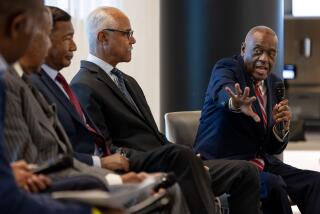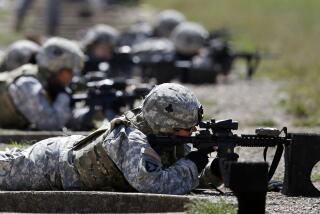The Corps’ Problem
- Share via
The article about Marine NCOs (“NCOs Stand Tall Again,” Oct. 4 ) was a fair attempt to bring to the public eye one of the problems facing today’s Marine Corps. But the essential problem was overlooked. Reorganizing and delegating more authority to NCOs may improve unit efficiency, but the real problem--the attitudes of those wearing less rank (privates, lance corporals) would change little.
As a lance corporal in an infantry unit at Camp Pendleton, I can speak from experience. The problems the Marine Corps is facing now are primarily due to the simple fact that the vast majority of Marines don’t like being in the Corps. A brief look at reenlistment statistics will tell you that. The reasons why this is so are numerous. Every individual Marine has his or her own reasons for liking or disliking the Corps.
Today’s enlisted Marines are, on the average, better-educated and more open-minded than their predecessors. We grew up in a time when it was acceptable to question the actions of our leaders. However, if a junior Marine asks, “Why?” the answer he will most likely receive will be, “Just %*$&-ing do it.” Today’s Marines may find the outdated training methods amusing initially, but they will surely find them purposeless and pitiful after having to follow them routinely. Intelligent young men and women are immediately repelled when faced with the adolescent, macho mentality presented by so many of their Marine superiors.
Consequently, the majority of the “troops” find their situation completely unsatisfying and very often depressing. This only creates a unit morale that is unbelievably low.
Analyzing officer and NCO proficiency will not solve this problem, if it can be solved at all. To get to the root of the problem, those of less rank should be heard. In Sunday’s article, your reporter was guilty of the same crime committed by Marine officers and NCOs--not listening to the views of the “non-rates.” We represent the vast majority of Marines. Interviewing retired generals and career sergeants major for articles about “today’s” military will undoubtedly produce misleading ideas.
If the Marine Corps isn’t living up to its old image, which is largely based on myth, maybe it should change. But don’t always look to the “old Corps” ways for answers. I think original changes may produce more positive results.
JASON A. BAYNE
Camp Pendleton


